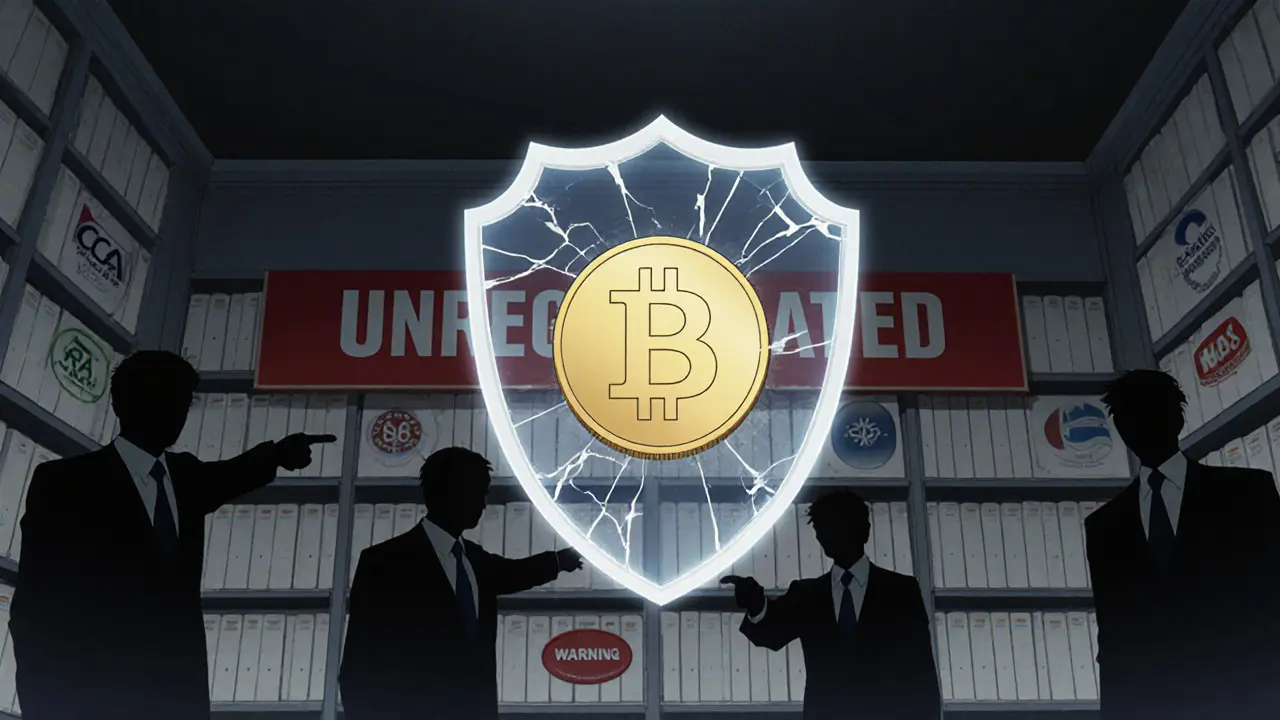Crypto Exchange Regulation Checker
Check Exchange Regulation Status
Verify if a crypto exchange is properly regulated by major financial authorities
Key Takeaways
- Karatbit operates without any recognized regulatory licence and is listed as ‘Untracked’ on CoinMarketCap.
- The exchange is tightly linked to the Karatgold Coin (KBC), a gold‑backed token that has shown severe price decline.
- Security, liquidity and user‑support are all below industry standards - many users report blocked withdrawals and unresponsive help desks.
- Major regulators in Canada, the UK and Singapore have issued formal alerts warning investors.
- Compared with regulated giants like Binance or Coinbase, Karatbit offers no protection, no audits and virtually no trading volume.
When you type Karatbit review into a search box, you’re probably trying to decide whether to trust a platform that markets itself as a gold‑backed crypto hub. Below, I break down the most relevant facts, from legal standing to technical performance, so you can make an informed call without chasing down scattered forum threads.
Karatbit Crypto Exchange is a cryptocurrency trading venue launched on 3 February 2019 and registered under Karat Gold Cooperation PTE. LTD. at 111 North Bridge Road 1 #08‑06 Peninsula Plaza 1, Singapore. The platform’s sole differentiator is its affiliation with Karatgold Coin (KBC), a token that claims each unit is backed by a fraction of physical gold.Regulatory Landscape - A Legal Vacuum
Regulation is the backbone of any trustworthy exchange. Karatbit, however, flies under no licensing regime. The Canadian Securities Administrators (CSA) listed the platform in its investor‑alert database (case CSA‑2025‑08732) as a high‑risk scheme, noting the absence of any recognised oversight. The UK’s Financial Conduct Authority and Singapore’s Monetary Authority have also flagged Karatbit as a potential scam.
In contrast, exchanges such as Binance, Coinbase, Kraken and Bitstamp hold licences in multiple jurisdictions, including the Swiss Financial Market Supervisory Authority and the Bermuda Monetary Authority. Those licences obligate the platforms to keep client funds segregated, undergo regular audits and implement robust AML/KYC programmes. Karatbit’s KYC process stops at email verification - no ID, no address proof, no facial check.
Liquidity and Volume - The Numbers (or Lack Thereof)
Liquidity determines whether you can actually enter or exit a trade without bruising the price. According to CoinMarketCap’s October 2025 snapshot, Karatbit is an “Untracked Listing” - it reports no verified trading volume. By comparison, Binance logged $1.8 trillion in monthly volume for September 2025, while Coinbase posted $32 billion for the same period (CryptoCompare, 2025).
The only token with genuine depth on Karatbit is the Karatgold Coin (KBC). CoinGecko shows KBC’s 24‑hour volume at roughly $12,450, spread over just three trading pairs. That’s a drop‑in the bucket next to USDT’s $52 billion daily turnover. Low volume translates into wide spreads, slippage and, frankly, a higher chance that you can’t withdraw when you want.
Security Practices - What’s Missing?
Established exchanges publish proof‑of‑reserves, cold‑storage percentages and third‑party audit reports. Karatbit offers none of these. Neither ISO 27001 nor SOC 1 Type 2 certifications appear on its site, whereas South Korea’s Korbit proudly lists both (TradingFinder, Oct 2025). Without independent verification, the claim that KBC is backed by physical gold remains unsubstantiated.
Security incidents reported on Revain.org (Oct 2025) describe blank pages, excessive load times and outright withdrawal blocks. A user tried to pull 0.5 ETH and was denied with a fabricated “KYC issue” on October 18 2025. Another complaint notes that after depositing SGD 2,500 in KBC, the token vanished from the user’s dashboard overnight.

Interface, Support and User Experience
First impressions matter. The Karatbit UI is riddled with empty sections and sluggish page loads - a symptom of under‑invested infrastructure. While Binance and Coinbase constantly roll out UI upgrades (weekly for Binance, monthly for Coinbase), Karatbit’s last major UI refresh was in June 2023.
Support is equally sparse. The Help Center hosts 12 stale FAQ entries; ticket response times often exceed 30 days. In contrast, Coinbase’s support library contains over 1,200 up‑to‑date articles, and Binance offers live chat 24/7.
Gold‑Backed Token Model - Does It Deliver?
Karatgold Coin (KBC) promises each token mirrors a fraction of physical gold. However, Dr. Elena Rodriguez’s 2025 paper in the Journal of Financial Cryptography identified seven of nine classic red flags for gold‑backed scams present in Karatbit’s model - unverifiable reserves, opaque pricing and excessive referral commissions (above 30 %).
Price action supports the warning signs. KBC fell from $0.082 in January 2025 to $0.014 on 22 October 2025 - an 83 % annual decline, while Bitcoin grew 28 % in the same window. The volatility gap is stark: CryptoWisser’s analysis shows KBC swings of 68 % over six months, versus gold‑ETF GLD’s sub‑15 % volatility.
Comparison Snapshot - Karatbit vs. Major Exchanges
| Attribute | Karatbit | Binance | Coinbase |
|---|---|---|---|
| Regulatory Licence | None (unregulated) | Multiple (Bermuda, Singapore, EU) | US (NYDFS), EU, UK |
| 24‑h Volume (USD) | Untracked / < $15k | $52 billion (USDT) | $38 billion (BTC, ETH) |
| Security Certifications | None disclosed | ISO 27001, SOC 1/2 | ISO 27001, SOC 2 |
| Gold‑backed token | Karatgold Coin (KBC) | None | None |
| User Support | 12 FAQ entries, email only | Live chat, 24/7 | Phone, chat, extensive docs |

What Experts Are Saying
TradersUnion’s October 2025 review, authored by compliance specialist Mark Reynolds (12 years in financial regulation), bluntly states: “The absence of any regulatory framework means client funds operate in a legal vacuum where recovery mechanisms don’t exist.”
J.P. Morgan’s Digital Asset Report (15 Oct 2025) predicts a 90 % failure rate for unlicensed gold‑backed exchanges within 18 months - Karatbit falls squarely in that category. Forbes quoted crypto analyst David Chen: “Platforms operating without regulatory oversight in 2025 face existential risk - Karatbit’s structure makes recovery impossible if funds are lost.”
Red Flags Checklist - Should You Walk Away?
- No regulatory licence in any jurisdiction.
- Listed as “Untracked” on CoinMarketCap - no verifiable volume.
- Absence of security audits, cold‑storage disclosures, or ISO certifications.
- Gold‑backed token with unverifiable reserves and extreme price volatility.
- Customer‑support response times exceeding 30 days and blocked withdrawals.
- Multiple official investor alerts (CSA, FCA, MAS).
If you see even two of these items, consider steering clear.
How to Protect Yourself in the Crypto Space
- Stick to exchanges with clear licences (e.g., Binance, Coinbase, Kraken).
- Verify proof‑of‑reserves and third‑party audits before depositing large sums.
- Prefer tokens with deep liquidity and transparent on‑chain activity.
- Use hardware wallets for long‑term storage instead of keeping funds on an exchange.
- Keep an eye on regulator alerts - they move fast in the crypto world.
Bottom Line
Karatbit’s promise of gold‑backed trading looks shiny, but the underlying reality is a barely regulated platform with low liquidity, poor security, and a track record of blocked withdrawals. When you weigh the risks against the benefits, the odds heavily favour staying away.
Is Karatbit a licensed cryptocurrency exchange?
No. Karatbit operates without any recognized financial licence. Regulators in Canada, the UK and Singapore have issued formal alerts warning investors about the lack of oversight.
Can I safely withdraw my funds from Karatbit?
User reports from October 2025 show frequent withdrawal blocks and long‑delay support tickets. Without a regulatory framework, there is no guaranteed recovery mechanism.
What is the Karatgold Coin (KBC) and is it a good investment?
KBC claims to be gold‑backed, but the reserves are not independently verified. Its price fell more than 80 % in 2025, showing extreme volatility and low liquidity.
How does Karatbit compare to Binance or Coinbase?
Unlike Binance and Coinbase, Karatbit lacks regulatory licences, security certifications, and transparent volume data. Its support is minimal and its token offering is limited to KBC.
Where can I find official warnings about Karatbit?
The Canadian Securities Administrators (CSA) investor‑alert database, the UK Financial Conduct Authority, and Singapore’s Monetary Authority all list Karatbit as a high‑risk platform.









Write a comment
Your email address will be restricted to us